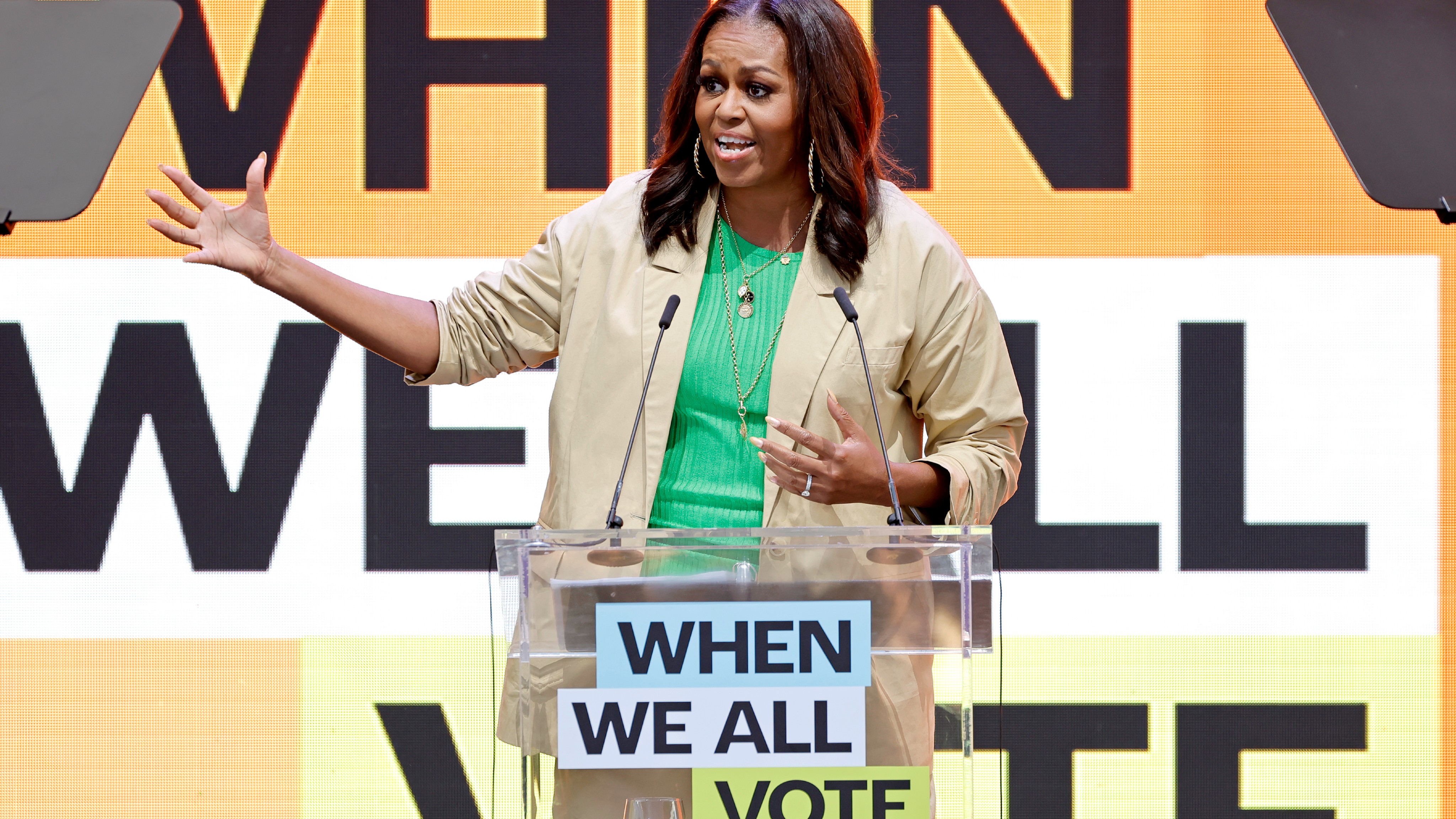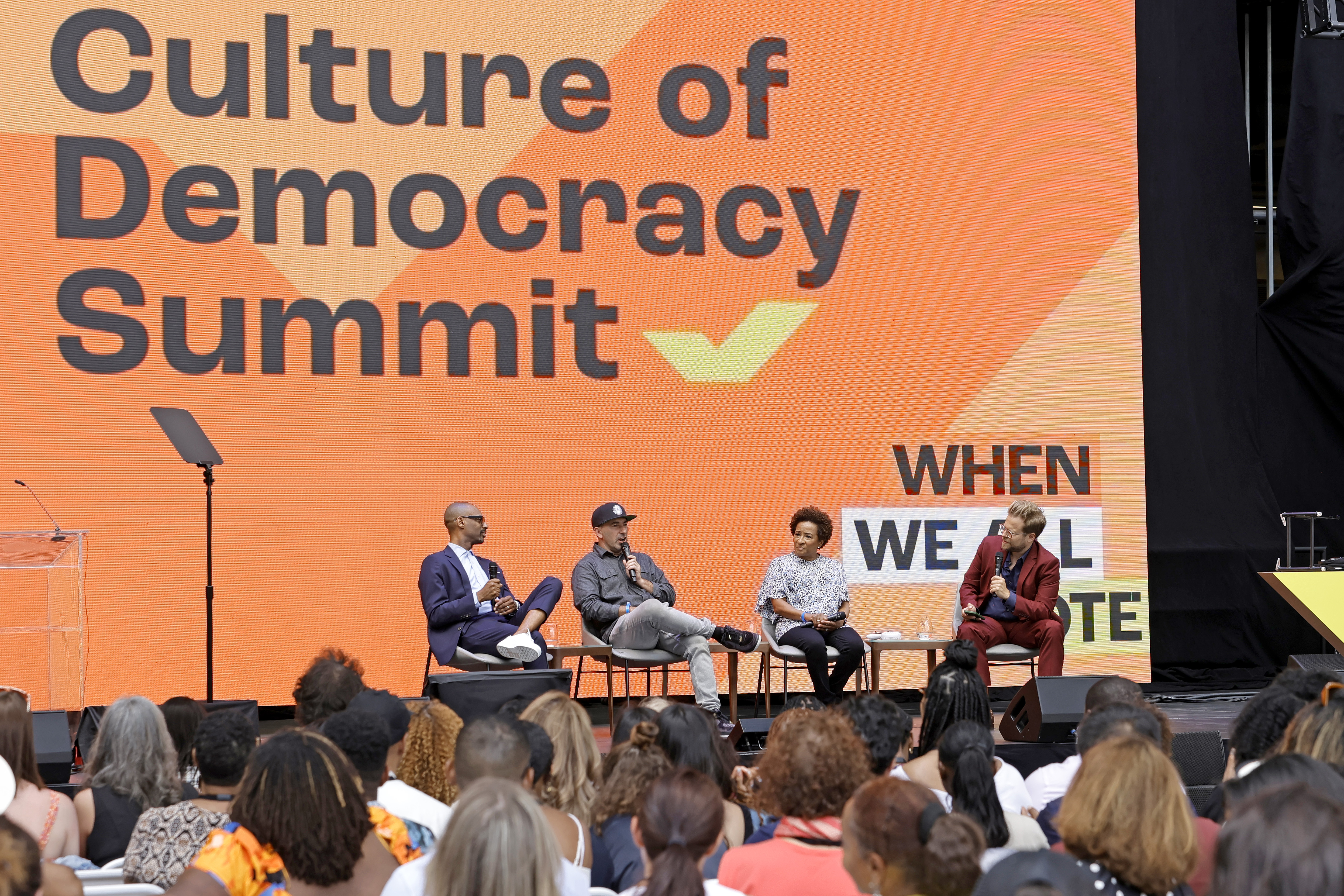5 Practical Things You Can Do to Protect Democracy
Advice from top celebrities and Michelle Obama herself.


Under a clear blue California sky, in a soccer stadium usually home to Natalie Portman’s Angel City Football Club, Michelle Obama gathered election experts and executives, political pundits and pop stars, NBA legends and newspaper reporters, and high school heroes and Gen Z influencers to address the gathering clouds threatening American democracy.
“I'd love to be able to tell you that everything is as it should be, …clear my throat and say the state of our democracy is strong. But you and I, we all know that I can't say that right now,” Obama, founder of When We All Vote, told the crowd at the non-partisan civic organization’s first ever Culture of Democracy summit in June. Obama cataloged the long list of America’s challenges, including alarmingly frequent mass shootings, climate change, Georgia’s restrictive voting laws, the January 6 insurrection, and how lies about the 2020 election threaten the fairness of future elections.
“I want every one of you right now to think about what you are uniquely able to do to protect our democracy,” Obama said. That might mean brainstorming service ideas with your friends over brunch, employers giving their employees time off to vote, and screenwriters writing stories promoting voting and equality, she suggested. (Girlfriends and The Game executive producer Mara Brock Akil took the brunch idea one step further, telling me after her own on-stage discussion: “Make the brunch volunteering, and caring, and understanding the issues.”)
Figuring out where to start your journey to saving democracy can be overwhelming, so practical advice was a recurring theme of the summit. Here are some additional tips from the former First Lady’s star-studded pals, who also took the stage that day, from those who helped run the country to those who run the media, entertainment, and sports worlds:
1. Pledge to vote in the 2022 midterms and every local election.
Selena Gomez, When We All Vote Co-Chair: “This November, in the midterm elections, we will decide who serves in all 435 seats in the House of Representatives, 35 of 100 seats in the Senate, and countless elected officials on the local and state level. But we can’t ignore that a lot of people don’t vote in the midterm elections. We’re here…to change the culture around voting and increase participation in each and every election.”

Selena Gomez, co-chair of When We All Vote, spoke about the importance of voting in all elections.
2. Get your employer in the fight for reproductive rights.
Alexis McGill Johnson, CEO of Planned Parenthood: “The C-suite needs to hear from their people [about abortion rights]. A lot of corporations are telling me… ‘We know this matters to our people, but we're not hearing it.’ …[Employees] need to be clear that people want to work for companies that align with their values, people in those companies can organize with each other.”
McGill Johnson suggested employees go through their employee resource group, and, if they need a template for how businesses can support reproductive rights, look to actions taken by companies like Salesforce and Lyft.
Get exclusive access to fashion and beauty trends, hot-off-the-press celebrity news, and more.
3. Choose the democracy battle that’s right for you.
Nikole Hannah-Jones, Pulitzer Prize–winning creator of the New York Times's 1619 Project: Hannah-Jones pointed out that one person can’t tackle all the problems. “Ask yourself, What’s most important to [me]? What is the thing that [I'm] most worried about? And then find an organization that's already working on that. …I promise you, if it matters to you, there's someone who is already working on it.”
“Another way to think is where do you think you can have the most impact? …What impacts your life the most is what's happening in local city councils, your local school board, and in your state house. It's much easier to have influence there than anywhere else. So you're concerned about these anti-history laws? Start with your local school board. Are you concerned about women's reproductive rights? States can pass laws that make sure women have access, or they can restrict access, to abortion.”

The first Culture of Democracy Summit gathered activists and celebrities to discuss practical ways to protect our democracy.
4. Start local, take it one step at a time, and take care of yourself.
Valerie Jarrett, Senior Advisor to President Barack Obama: “Change happens on the ground. I started my career in public service, working at the local government in Chicago. And I appreciate that there's no room for partisanship on the ground. You just want to make the lives of the people in your community better. … You don't have to focus on what seem like insurmountable problems. You can focus on what you can do, and then when you get that done, do something else.” She pointed to WhenWeAllVote.org as a starting point to find local organizations and opportunities to volunteer in your community.
Jarrett also urged Marie Claire readers to ask themselves: What do you need to make the fight for justice a marathon, not a sprint? “Change happens too slowly, but it does happen if you are indefatigable. So you just have to restore and replenish yourself. … Self-care is an important part of being a leader,” she said. (A quick self-care idea? Consider embracing McGill Johnson’s move for getting her day going: blasting Mary J. Blige’s Good Morning, Gorgeous.)
5. If you see something, say something.
Philadelphia 76ers head coach Doc Rivers, whose post-game commentary on the treatment of Black Americans has gone viral on multiple occasions: “If it’s wrong, then you should say something about it. … Pick your spots, but be consistent and be loud. If you’re morally right about an issue, if you don’t speak up about it, it creates more issues than if you do.” (The Real co-host Jeannie Mai Jenkins, provided a funny but useful example of saying something: She supports labor unions by posting on social media and tagging companies mistreating their workers. “I’m into dragging people to make them do right.”)
Erin Geiger Smith is a reporter and the author of Thank You for Voting and its companion young readers' edition. Her work has appeared in publications including the New York Times and the Wall Street Journal, and she was previously a legal reporter and Reuters.
